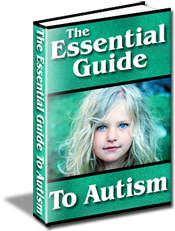Does Your Child Have Autism?
Click Here To Know The Simple Methods To Effectively Spot The 31 Signs of Autism
To find out if your child is manifesting the symptoms of autism consider the following assessments:
1. Your child shies away from or repels human contact or affection:
An autistic child does not want to be hugged. They usually stiffen when held. They are not comforted by being held or cuddled.
When an autistic child is having temper tantrums or is anxious, it is better not to hug the child to provide reassurance and comfort, instead, give the child his favorite toy or transfer the child to a less stimulating environment.
2. Your child is usually stimulated from within and not by the outside world. He or she have difficulty in processing external stimuli:
The ability to receive stimuli from the environment is blocked so the child:
a. is unable to differentiate self from the environment thus the reversal of pronouns, the child talks about himself in third person.
b. has delayed development of self-help skills, such as feeding, dressing and toileting.
c. has difficulty or inability to learn expressive communication: echolalia, mutism.
d. is unable to enjoy meaningful relationship with the outside world: does not respond to people or other environmental stimuli, may be unable to make eye contact.
e. is aware only of himself and engages only in self-stimulated acts: plays alone for hours, withdraws from other children but may advance to parallel play.
f. turns to inanimate objects: attachment to a security blanket.
3. Your child develops stereotypic body movements:
These may consist of rocking, spinning, hand flapping, and other repetitive activities.
4. Your child shows obsessive desire for sameness:
An autistic child usually adheres to routines and rituals and has great aversion to changes.
5. Your child shows impulsiveness:
A child with autism may engage in temper tantrums when interrupted in his or her activity.
6. Your child shows inclination to self mutilation:
An autistic child can sometimes engage in head banging especially during tantrums.
7. Your child shows heightened withdrawal manifested by refusal to eat.
8. Your child exhibits More severe motor clumsiness associated with lower IQ.
9. Your child develops schizophrenia or seizures.
10. Autism is sometimes associated in some degree with mental retardation. Although accurate IQ measurement may be difficult to obtain due to the lack of language in these individuals, 60% of children have an IQ less than 50; 20% between 50 and 70; and 20% have an IQ greater than 70. Autism is more common in males than females by three to one.
The author, Jose Feliciano, is personally involved with autism having a family member with this disorder. To get more information about autism, visit his website at MyAutisticBoy.com.
Labels: abilify_autism, acceptance_autism_book, activity_autism, adult_autism

